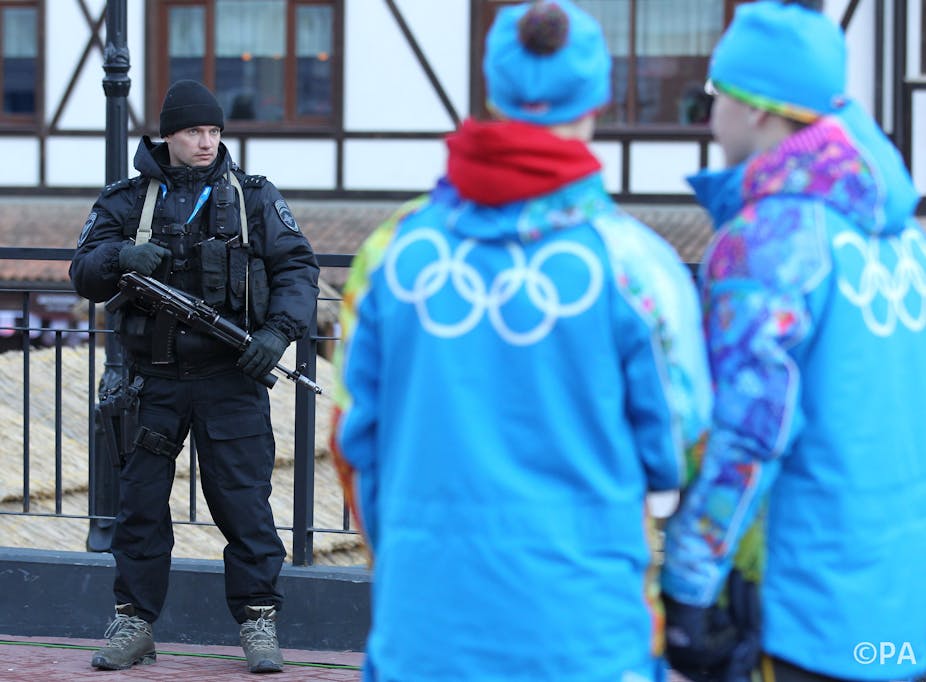One thing dominates the Sochi Olympics as nothing else: the towering summits of the Caucasus mountains. To begin with, it may strike a first-time visitor as strange that this seaside resort is to host a winter games. A journey inland along a winding mountain road shows why. The Alpine Centre at Krasnaya Polyana is striking for its scenery of icy slopes and distant peaks.
The landscape here is both the making of Sochi as an Olympic venue, and part of one of the main challenges the games face: security.
Since Moscow first brought the North Caucasus under its control in the 19th century, all the various incarnations of Russian power – tsars, Communist Party leaders, presidents – have faced a challenge here. Place names reflect the conflicts of history. Grozny, the capital of the Russian region of Chechnya, is the Russian word for “terrible” or “threatening” (16th century tsar, Ivan the Terrible, is called in Russian “Ivan Grozny”). Just as Vladivostock on Russia’s Pacific Coast might be translated as “ruler of the East”, Vladikavkaz, regional capital of North Ossetia, means ruler, or possessor, of the Caucasus.
Putin the possessor
The latest round of confrontation between Moscow and Russia’s mountainous southern edge stretches back almost 20 years. In December 1994, Boris Yeltsin’s government launched a military campaign to bring Chechnya back under the control of the Russian federal government. That war lasted until 1996, only to start again in the Autumn of 1999 – by which time Vladimir Putin was Russia’s prime minister.
Yeltsin’s unexpected resignation on the last day of 1999 meant Putin became acting president – a position which was confirmed by elections held in March 2000. Putin’s rise to power, in other words, took place against the background of violent conflict in the North Caucasus: something to which he referred in a recent interview.
Discussing the security challenges which the Sochi games face, Putin warned: “We must show no fear to terrorists.” Recalling the Chechen wars of post-Soviet Russia’s first decade, the Russian president spoke of the “tough, bloody, events in the Caucausus”.
Rousing hatred
I reported on some of that bloodshed on various trips to the region as a journalist between 1995 and 2008. The nature of the threat facing Russia’s authority has changed in at least two important ways since the separatist wars in Chechnya two decades ago.
First, those fighters who remain opposed to Russian rule in the Caucasus have increasingly defined themselves by their adherence to their interpretation of Islam. Second, the low-level insurgency – which manifests in frequent attacks on government officials and security personnel – has spread beyond Chechnya, particularly to the neighbouring regions of Ingushetia, and Dagestan.
Russia’s response has been less than perfect. Tens of thousands of civilians – no one, it seems, has ever been able to compile an entirely accurate figure – were killed in Chechnya alone. The Russian political establishment understands the scale of the problem it is facing. In 2009, then president, now prime minister, Dmitry Medvedev, referred to the North Caucasus as Russia’s “most serious, domestic political problem”.
Faced with this deadly threat, the authorities in Moscow have tried various different approaches such as security crackdowns and increasing funding to the regions. Yet they seem to have lacked a long-term strategy: focusing instead on tactics aimed at delivering short-term stability.
That has not always worked. In particular, the security forces have been accused of human rights abuses. An Amnesty International Report published last year highlighted in particular the problems facing lawyers working in the region. In in her 2003 book A Small Corner of Hell: Dispatches from Chechnya, Anna Politkovskaya, the Russian journalist murdered in 2006, wrote:
The only thing the methods of this war accomplish is to recruit new terrorists and resistance fighters, and to rouse hatred, calling for bloody revenge.
Putin’s test
As the games have come closer, there has been an upsurge in violence – despite the Russian state’s massive security operation. Suicide bombings in the southern city of Volgograd at the end of December killed 34 people. These were the latest in a series of attacks aimed at targets outside the North Caucasus region. No particular group has said it was behind the Volgograd bombings, but coverage both in western and Russian news media has speculated that the attacks may have been connected to the build-up to the games.
In the same interview quoted above, Putin denied the games were in any way about his “personal ambition”. Yet right from the bid’s early stages he has been closely involved. He famously went to Guatemala to support Russia’s bid in person. And given the fact that he has dominated Russia’s post-Soviet politics like no other figure, the success or otherwise of the games will inevitably be seen as a reflection on him.

